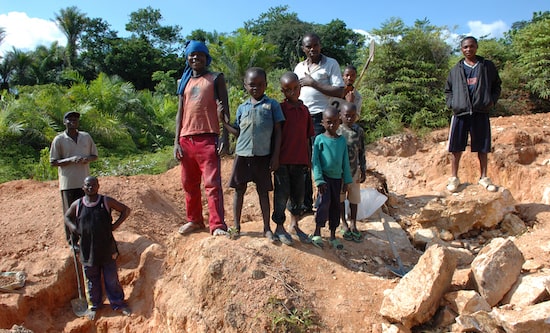
Boris Johnson told the virtual Conservative Party conference on 6 October of the first steps of his government’s 10-point plan for a ‘green industrial revolution’: to turn Britain into ‘the Saudi Arabia of wind power’. He claimed that within ten years every home will be powered by electricity generated by wind turbines. This sounds like a significant step in the right direction. But simply replacing the energy sources of capitalist Britain is an attempt to preserve the existing imperialist relations of exploitation. Wind turbines require a wide range of elements which are sourced from brutal extractive industries in the underdeveloped world. For example, the magnets in wind turbines, and the batteries required for energy storage, rely on cobalt – a mineral notorious for its human cost which is fast becoming indispensable for the so-called ‘green transition’.
Cobalt is one of the elements most crucial to modern electronics, with its most widely-known use being in smartphone batteries. This is due to its role (as lithium cobalt-oxide) in lithium-ion batteries, which are 15% cobalt. These batteries are used in most laptops and other consumer electronics, as well as in huge battery banks to store the energy produced by renewable technologies such as wind. With the shift away from fossil fuel vehicles however (another plank of Johnson’s green industrial revolution), the primary use of lithium-ion batteries is fast becoming batteries for the ballooning fleet of electric cars. Other cobalt goes towards the production of electronic permanent magnets, such as those used for wind turbines and many engines. Demand for cobalt has doubled in the last year as companies ramp up for further ‘green’ production.
Up to 70% of the world’s cobalt comes from the Democratic Republic of Congo (DRC), which has more than 50% of known reserves. The cobalt industry (along with other mining) goes a long way to explaining why imperialist nations have fomented decades of civil war in the huge central African state, following its brutal and extractive colonial history. It is the archetypal victim of the ‘resource curse’ – in this perverted imperialist world it is one of poorest states but one of the richest in natural resources. Mining companies such as Britain’s Glencore (the world’s largest cobalt miner) take advantage of DRC’s lack of regulation, corruption and a desperately poor standard of living, to extract cobalt in ways which would be uncompetitive elsewhere. As such the DRC’s share of the cobalt market is expanding. Australia also has major cobalt reserves (16%). Cuba, the Philippines, Zambia, Russia, Canada, Madagascar, Papua New Guinea, South Africa and the United States also have reserves – but most of them extract relatively little.
20-40% of the DRC’s cobalt mining is done by so-called ‘artisanal’ miners – informal workers without basic rights and protections. UNICEF estimates that 40,000 children are involved in artisanal mining in the DRC. In December 2019 International Rights Advocates launched a lawsuit in Washington DC on behalf of 14 parents and children from the DRC. Apple, Google (through its parent, Alphabet), Microsoft, Dell and Tesla were listed as defendants. The case accuses the companies of ‘knowingly benefiting from and aiding and abetting the cruel and brutal use of young children’ in the mining of cobalt. It states that children as young as nine are working as ‘artisanal’ miners at mines run by Glencore and China’s Huayou Cobalt. They are working for less than $1 a day and are often killed and maimed in accidents. The UN estimates that at least 80 children a year are killed in this way.
The case argues that Glencore and Huayou mix the cobalt mined by artisanal miners with cobalt which is mined by employees with better working conditions. This is done to intentionally ‘impair the traceability’ of the cobalt, allowing the tech companies ‘plausible deniability’ of child labour in their supply chains. DRC cobalt mining has also been shown to have a massive environmental cost, through water pollution – leading to numerous health problems – and huge carbon emissions. These emissions however are racked up on the DRC’s carbon balance sheet – not that of the imperialist countries where the bulk of the money and goods end up.
Cobalt however is one ‘green’ resource which allows us a glimpse of a different way of managing the transition to a fossil fuel free future. Socialist Cuba has its own cobalt industry, and despite having to function in a global capitalist market, it shows some of the ways that a humane mineral industry could be managed. Cuba’s cobalt reserves are the third largest in the world and it provides 4% of the global supply. Cuba is regularly praised in NGO reports assessing the cobalt industry, as state control of production and tight labour and environmental regulations mean that the element can be extracted without the exploitation and destruction seen in the DRC (see for example: International Institute for Sustainable Development, 2018). Despite this, many companies are wary of sourcing their cobalt from Cuba – in 2018 Panasonic suspended supply from Cuba to avoid potential infringements of the US blockade.
Increasing attention to the wider costs of capitalist cobalt, as well as global competition, is leading to attempts to remove cobalt from electronics. Tesla and the EU have both stated that they want to move towards cobalt-free batteries. If this is feasible it will just shift the burden to other elements subject to the same capitalist pressures – such as vanadium. A truly sustainable society cannot be built through an approach which replaces individual fossil fuel cars with a similar number of electric cars. Consumption and extraction patterns will have to change for the collective good. Where resources like cobalt are essential, proper regulation and labour rights could ensure that these elements are extracted without a prohibitive social and environmental cost. Under capitalism, any ‘green industrial revolution’ will have its victims. Only by challenging the profit motive can we start to build a society which actually values the Earth and what it can provide.
Toby Harbertson




